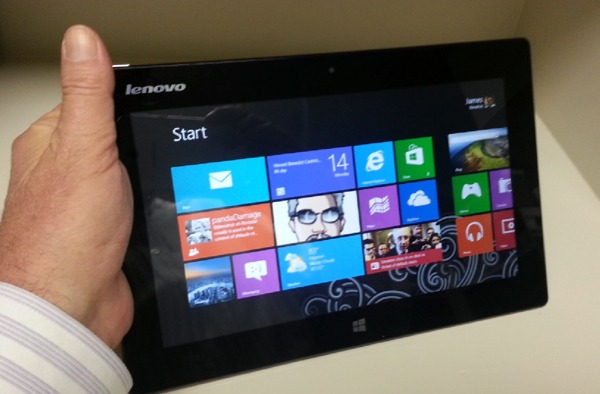Most significant mobile tech of 2013: Windows 8.1

This year has seen a lot of things happening in mobile tech, from the rise of wearables to the evolution of most mobile platforms. Of all that has appeared in 2013, the most significant advancement in mobile tech is the release of Windows 8.1.
That proclamation may be surprising to some, but it's the event with the most far-reaching implications on mobile tech, more than anything we've seen this year. Windows 8.1 has a direct bearing on the direction of mobile platforms, and with a big potential impact on both mobile tech and Microsoft.
The appearance of Windows 8.1 is more significant than the original release of Windows 8. The latter was the result of Microsoft's starting over with Windows, and as a company. The folks in Redmond saw the writing on the tech wall, and it clearly said mobile is the future. That's why it basically threw out earlier versions of Windows, although they are buried deep inside Windows 8, and started fresh with a version that could bridge the mobile divide.
The most impressive thing about Windows 8.1 is not how well it addressed the shortcomings of Windows 8, rather how fast Microsoft did it.
As impressive an effort Windows 8 was, it fell short in addressing the mobile nature it was intended to have. It did some things well, others not so much, and even Windows enthusiasts were complaining about various features of the new OS.
Yes Virginia, Windows 8.1 is a mobile OS
While updates are the natural order of things in the OS world, make no mistake, Windows 8.1 was largely created to address those things people didn't like about the first release. It was intended to make the OS work better on tablets, as mobile is very important to both Windows and Microsoft.
In that effort Microsoft succeeded, as Windows 8.1 has turned the platform into a good one for tablets. It does so while also becoming a good engine for notebooks, the other side of the mobile coin. The update has turned Windows into a valid competitor in the mobile space, while keeping it a solid platform for running PCs of the non-mobile variety.
Besides bringing Windows into the mobile age, Windows 8.1 is significant for a couple of other major reasons. First, it is a strong basis for Microsoft's new devices and services mission. That mission brings hardware to mind, like the Surface tablets, but for that to work it must be built on Windows. That is why Windows 8.1 is so important not only to the mobile space, but to Microsoft in particular. With the latest version, the company has strengthened its foundation for the devices it will build.
Secondly, Windows 8.1 is equally important to the PC segment, as OEM partners of Microsoft need a strong OS to make products desirable. The latest version of Windows handles tablets and notebooks so much better than before, so OEMs can start taking advantage of that and making it a selling point. It's especially good that Windows 8.1 runs nicely on tablets of all sizes, and we'll start seeing those appear in greater numbers. That's good for Microsoft, OEMS, enterprises, and consumers.
The most impressive thing about Windows 8.1 is not how well it addressed the shortcomings of Windows 8, rather how fast Microsoft did it. Long a company known to slowly change its software products over many years, Microsoft not only listened to customers but took complaints to heart in a very short period. This is almost shocking for Microsoft, and a sign of the way things will be done going forward. This alone makes Windows 8.1 one of the biggest things we've seen this year.
Arguments can be made that other mobile tech events in 2013 were more significant: the appearance of smartwatches, Google Glass, Chromebooks, KitKat, and iOS7 to name a few. Those are all important but in this writer's view none will have the far-reaching impact as Windows 8.1 will in the mobile space. It is even more signficant than the release of the original Windows 8 for the reasons detailed. It will affect tablets, laptops, consumers, and the enterprise, and that makes it a very big deal.
See related:
- Hands on with the Yoga 2 Pro: Windows 8 any way you like it
- Windows 8.1: Makes the ThinkPad Tablet 2 even better
- ThinkPad Tablet 2: Best Windows tablet
- Acer W3 8-inch Windows 8 tablet: First impressions
- Windows 8 tablets: A confusing world for buyers
- Epiphany: Windows 8 is a very good tablet OS
- 10 advantages Windows 8 tablets have over the iPad and Android
- 10 disadvantages Windows 8 tablets have compared to the iPad and Android
